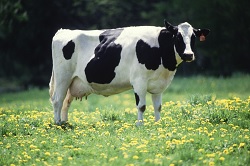 |
| Dairy cow--Courtesy of the Agricultural Research Service |
According to a new report by the FDA, some farmers continue to use antibiotics that routine tests don't detect, especially in dairy cows, because those drugs are banned.
In a random survey of samples of milk coming from about 2,000 U.S. dairy farms, the FDA looked for 31 different drugs. About half of the farms tested were part of a "targeted" group the agency said was under suspicion for sending cows to slaughter that had drug residues in their meat, NPR reported. The remainder of the group was a random sample of all milk producers.
The agency found a little more than 1% of the samples from the targeted group, and 0.4% of the random samples, contained drug residue. The most common drug found was the antibiotic florfenicol, with 11 other drugs also detected. None of the drugs detected by the FDA are approved for use in lactating dairy cows.
Mike Apley, a researcher at Kansas State University, told NPR that it was "totally illegal" for dairy farmers to use ciprofloxacin and sulfamethazine, both of which were found by the FDA during the recent testing.
Still, William Flynn, the deputy director for science policy for the FDA's veterinary medicine arm, pointed to the low number of violations the survey found. "These are encouraging findings," he told NPR. "Things are working well."
Flynn added that the agency will continue to look for illegal drug use by dairy farmers, which could include the testing of all milk for an expanded list of antibiotics.
- read the NPR story
- see the FDA report (PDF)